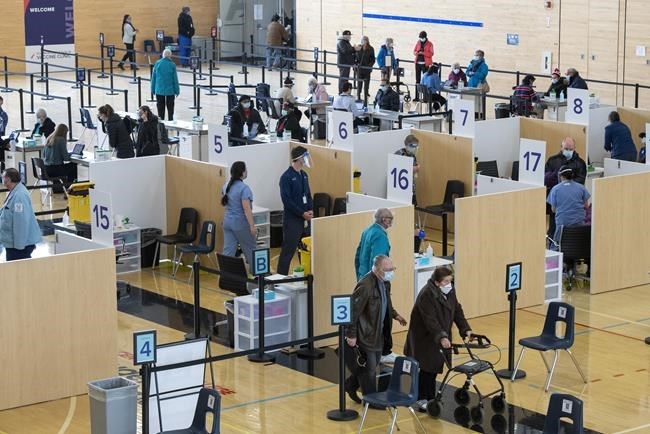Undocumented workers in Canada fear that getting vaccinated could mean being arrested if someone reports them to police or immigration authorities because of their lack of proper identification, say advocates.
Karen Cocq of the Toronto-based Migrant Workers Alliance for Change said undocumented and migrant workers should not be required to provide identification issued in Canada, including a health card, when they are booking appointments or attending clinics as part of a process to track vaccinations.
Cocq said many of the workers already don't use the health-care system because they're afraid of losing their jobs if an employer discovers their immigration status so it's not surprising they're hesitant to get vaccinated.
"People are very concerned about what happens with their personal information when they share it with any officials or with any authorities," she said.
"They've heard stories about what happens if (the Canada Border Services Agency) is called."
Cocq said vaccinations could be tracked using government-issued identification from a worker's home country or, as in the case for some homeless people in Toronto, through other means, such as an email address, a library card or a letter from a food bank or community agency.
People without permanent residency status are often employed as personal support workers or care aides in long-term care facilities, and in sectors like construction and agriculture, mostly in Ontario, Quebec and British Columbia.
Ontario alone is home to at least 500,000 undocumented workers based on data from 2016, Cocq said. The number is likely much higher now, she said, because of stricter language and education criteria for care workers, for example, which prevents some people from applying for permanent residency.
"Unequal access and barriers to getting the COVID-19 vaccine are a product of a person's immigration status," she said.
Anna Maddison, a spokeswoman for the Public Health Agency of Canada, said COVID-19 vaccines are available for everyone without a health card, but logistics involving identification requirements are decided by provincial and territorial governments.
Health ministries in Ontario and British Columbia said undocumented and migrant workers do not need to present medical cards before being vaccinated but they did not say whether non-government identification could be used.
The B.C. Health Ministry said information provided to public health officials for immunization will not be shared with other organizations. More details on the documents that will be asked for will be available when provincewide online registration starts on April 6, it said.
Cocq said the alliance has issued a proposal for various jurisdictions to provide clear information in multiple languages on booking websites about access to vaccinations for everyone, along with an assurance that personal details will not be shared with authorities.
Those policies should also be made available to people booking appointments on phone lines and administering vaccines at clinics so they're not asking for medical card numbers, she said.
Judy Illes, a professor of neurology at the University of British Columbia and the Canada Research Chair in neuroethics, said governments should quickly develop transparent processes to ensure everyone who wants a vaccine can get one in a safe environment.
"To the extent that new issues are arising, like hesitancy among undocumented workers, that needs to be addressed so there is trust in the system and the chances of discrimination are mitigated as best as possible," said Illes, who focuses on the ethics of vaccine rollout and access for vulnerable populations.
Byron Cruz, a spokesman for Sanctuary Health in Vancouver, said migrant and undocumented workers are eager to get vaccinated because their jobs put them at risk of being infected with COVID-19 and they often live in small spaces with many people.
"Our concern is that many of the construction workers live in an apartment with two bedrooms and there are sometimes 10 people there. That's a difficult situation for them," he said.
The grassroots advocacy group is ready to encourage workers to visit mobile vaccination clinics at their job sites if that option is available, but Cruz said they also need to give assurances that no one would be at risk of being deported based on their immigration status.
This report by The Canadian Press was first published March 26, 2021.
Camille Bains, The Canadian Press




